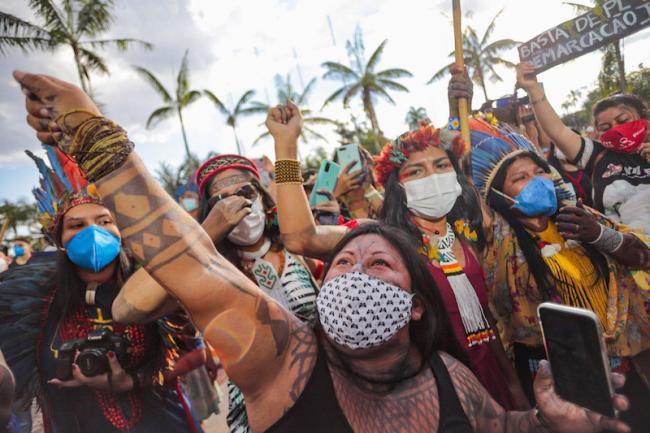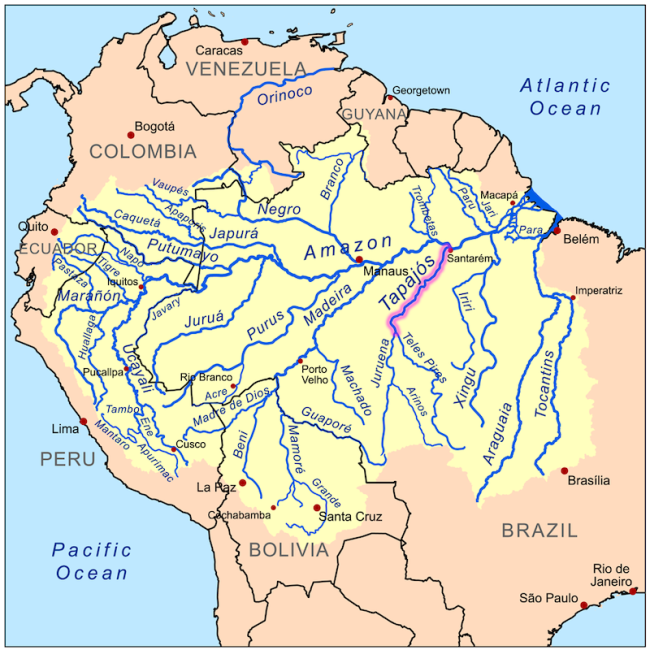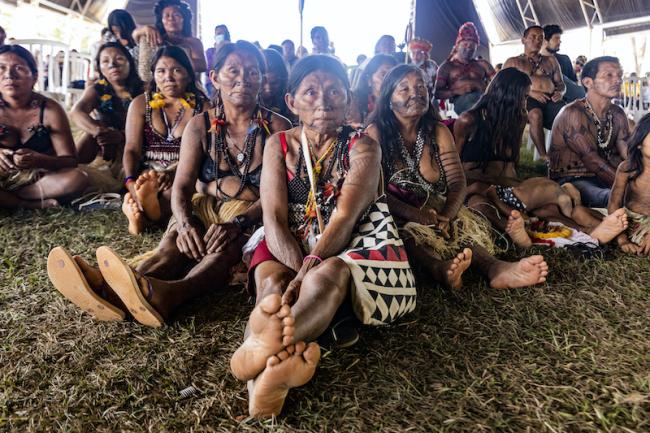
This piece appeared in the Summer 2023 issue of NACLA's quarterly print magazine, the NACLA Report. Subscribe in print today!
Leia este artigo em português.
Located in the heart of the Brazilian Amazon, the Tapajós River Basin was once so extensively inhabited by the Munduruku people that, in the 19th century, the entire region was called Mundurukânia. The Tapajós is still deeply marked by the presence, culture, and politics of the Munduruku people, who today number around 13,000 in more than 100 villages along the Tapajós River and its tributaries in northern Mato Grosso, eastern Amazonas, and western Pará states.
The Munduruku are, in their own words, a people with a warrior tradition. Today, they are at war with a constellation of extractive and infrastructural projects that threaten to transform their territory into an enormous sacrifice zone in the name of gold and timber extraction, soy production, and hydroelectric energy.
Alessandra Korap Munduruku became a leader amid the Munduruku’s relentless struggle against these projects. Alessandra lives in the village of Praia do Índio, in the Médio Tapajós region, and over the last decade, she has dedicated her life to the Munduruku resistance movement, which wages a multifaceted struggle for the Munduruku territory and ways of life. This struggle includes autonomous strategies of self-demarcation and territorial oversight combined with political advocacy to pressure the government to recognize all its lands. The struggle also involves forming alliances with other communities against illegal gold mining and infrastructure projects that threaten their territories, such as Federal Railway 170, nicknamed “Ferrogrão” (a combination of the Portuguese words for railway and grain), which will mainly serve to transport soybeans from Mato Grosso through the country’s north. Other projects include the Tapajós Waterway and the São Luiz do Tapajós hydroelectric plant, the latter of which, despite having its licensing process shelved in 2016, still looms as a threat to Indigenous, riverine, and traditional peoples throughout the region.
I spoke with Alessandra Korap on March 8, 2023, a month before she received the Goldman Environmental Prize for her work in the Munduruku struggle to defend the Amazon rainforest and waters. In our interview, she condemns the impacts of illegal mining on Indigenous lands in the Amazon and talks about the obstacles she and other Indigenous women face in politics. Emphasizing the need to continue fighting and “not sleep” even though Brazil now has a leftist government, she explains the Munduruku’s constant struggle for the right to exist as a people. Our conversation was lightly edited for length and clarity.

Ana Carolina Alfinito: In early 2023, the world witnessed the images of the human and environmental devastation caused by mining in the Yanomami Indigenous Land. Tell us about these images and how they relate to what happens within Munduruku territory and other Indigenous lands.
Alessandra Korap Munduruku: I’ve been following the situation in Yanomami land for three years, and the Yanomami have been tirelessly denouncing the invasion of illegal mining within their territories for longer than that. I went to Yanomami territory; I saw the shamans and the women saying that they needed help—crying out for help. The women decried that their people were getting sick, that they were being threatened, and that their granddaughters were being used as prostitutes by the prospectors, who offered objects like flashlights in exchange for 13- and 14-year-old girls. Yanomami associations [such as the Hutukara Associação Yanomami] have already made many complaints about this. It’s nothing new.
But all these years, the government has turned a blind eye and pretended not to see. And it is only now that the Lula government is trying to help the people because it knows that the whole world is watching Brazil. It’s not because Lula is nice.
The rivers and Munduruku lands are badly damaged by illegal mining. When I go to the village, I see children bathing in dirty water. The river is now just mud. Just imagine, we need to buy mineral water in the city to take to the village. We cannot drink the water in the village because it is all contaminated by mercury due to illegal mining.
Historically, the Munduruku people got everything they needed from their territory—water, game, and fish. We like all kinds of fish from the river: piranha, dogfish, peacock bass. But today we catch a fish, go to the riverbank, look at it, and know that it is contaminated with mercury. We know that it will make us sick. But we’re going to eat it anyway, because there’s no other way. There is no other form of food, and it is contaminating everyone.

Studies by the Fundação Oswaldo Cruz show that women and children are most vulnerable to mercury poisoning, which affects everyone in the Munduruku villages of Sawré Muybu, Poxo Muybu, and Sawré Aboy in western Pará state. The cause of contamination is gold mining, which has increased by almost 500 percent in Indigenous areas since 2010, with broad support from the Bolsonaro government. Research also shows that women’s breast milk is contaminating their children. Everyone knows that breast milk is important for children, and that breastfeeding is encouraged in the first years of life. But what about our children, who are being contaminated with mercury through milk? That’s why we fight against illegal gold mining and against logging.
Three years ago, the Yanomami, Kayapó, and Munduruku peoples formed an alliance against destructive illegal gold mining on their lands: the Alliance of Three Peoples. We did this because we know that destruction is not in the territory of a single people, and we know that we need to join forces to understand what is happening and to come up with strategies for struggle.
ACA: What do the Munduruku people expect from the Lula government with respect to garimpo (illegal mining), since it is carrying out an operation to clear invaders from the Yanomami Indigenous Land? What should the international community do about the rights violations tied to gold mining?
AKM: We hope that Lula’s government will be different, but we know that we cannot expect everything from the government, because there are two sides. There are people in Congress who are against Indigenous peoples and who are in favor of garimpo. In the case of our Yanomami relatives, the federal government is trying to remove illegal miners from inside the Indigenous land. But there is another side made up of senators and congressional representatives pressing against the operation. So it’s not easy. Leaders are being threatened and persecuted. The government has to talk to the communities. There needs to be security for the leaders. The people in the village need to be safe. Illegal miners have already burnt down a Munduruku leader’s house, and it could happen again.
Countries that buy gold and jewelry need to understand that it all comes from Indigenous lands and that there is no inspection policy for this gold. Today we are suffering from illegal mining. We are suffering from mercury-related illnesses, from malnutrition. Our people are bathing and drinking dirty water from the river. Countries that buy gold need to regulate it—they cannot buy illegal gold. Countries that like to say they are protecting the environment need to remember that Indigenous peoples exist. We are here, putting our lives and bodies on the line to defend the environment, because the environment is us. We are the ones who are fighting and facing guns pointed at our heads and invasions of our homes because there are countries buying gold and diamonds. There is no oversight. So these countries are also responsible and need to inspect their markets and their companies.
ACA: In Brazil, all mining inside Indigenous lands is illegal. So how did garimpo advance so much inside your territory?
AKM: Because there was a lot of encouragement, including from the federal government. [Former president] Jair Bolsonaro himself encouraged garimpo—it was an opportunity for illegal miners to enter Indigenous lands. Our lands were invaded very quickly, with no response from the government.
But the rivers that pass through our village also pass through the city. It’s not just us who are being contaminated—the Brazilian population is also being contaminated with mercury. Legal or illegal mining, it contaminates and kills the same way. Anyone who has gold, who has a wedding ring or earrings, is also contributing to the destruction and encouraging mining to kill the river and kill the people.
So we are very concerned. There is no way to stop the river, which is becoming dirty and contaminated because of illegal mining. And the mercury goes everywhere the fish go.
Read the rest of this article, available open access for a limited time.
Translated from Portuguese by NACLA.
Ana Carolina Alfinito is a lawyer, sociologist, and Brazil legal advisor at Amazon Watch.

